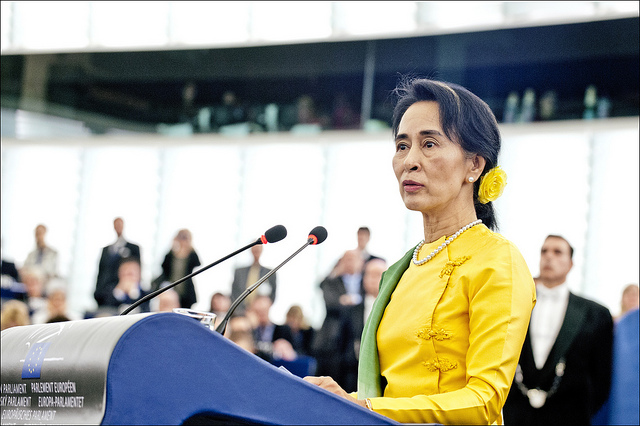Answers to the Western democratic malaise may come from unexpected places
Tamas Wells writes that most of the solutions proposed to the current malaise of liberal democracy are drawn from the Western canon of political thought and questions whether the very nature of ‘established’ democracies challenges their ability to innovate. In this light, he suggests there could be lessons for the West from places like Myanmar that are currently grappling with central tenets of democracy.

Credit European Parliament CC BY-NC-ND 2.0
Recognition of the ‘malaise’ of Western liberal democracy is in fashion. The 1990s high tide of liberal democratic confidence has been steadily abating for the last decades, a process which has sped up in the wake of the Arab Spring and Russia’s annexation of Crimea. New academic works and conferences on democracy are increasingly using words like ‘renewal’ or ‘innovation’.
But where are the cures for this malaise going to come from? Many think it lies in the redesign of democratic institutions to deal better with the hyper-connected realities of the 21st century – different forms of citizen engagement, a more participatory or more direct democracy. While these are valid lines of inquiry, the tools of these debates are most commonly drawn from within the Western canon of political thought. What about democratic thinking from further afield? Are there answers or ideas from places we might not expect?
I went to a lecture in Melbourne last year by Myanmar democracy icon and Nobel laureate Aung San Suu Kyi. During the question and answer session a young Australian girl asked her advice about how to reduce the apathy around democracy in the West, especially amongst young people. Suu Kyi laughed and suggested ‘they could try putting you under house arrest’.
The intriguing part of Suu Kyi’s response was that it pointed to the very different contexts within which ‘democracy’ is given meaning – young, politically engaged Australians are confronted with apathy, while young, politically engaged Burmese are confronted with prison or other restrictions on their freedom of movement or expression.
In Maarten Hajer’s work on environmental discourses, he brings an important insight into the way political narratives are formed. He suggests that they are formed as much by what they are against as what they are for. For example, in order to understand what someone means by the word ‘democracy’ we need to also understand what problem it is that democracy is perceived to be solving. What is the counter position against which democracy is mounted?
Returning to the context of the Myanmar democracy movement, the question of counter positions could hardly be clearer. Despite encouraging changes in recent years, the memories of military authoritarianism are fresh. Many within the movement have served time as political prisoners or had their friends or family persecuted in other ways. Democracy is something mounted against self-interested generals with guns. For many, it is defined as much by what it is not, as what it is. And it is still to be seen how this will influence the development of Myanmar’s emerging democratic institutions.
In contrast, for most citizens in the UK or Australia, the counter positions against which the institutions of Western liberal democracy were developed have been long forgotten. Questions of monarchical power or religious or class schisms were instrumental in shaping the Western liberal democracy we know today. Yet what does it mean to now have institutions defined in opposition to long forgotten problems? In the West democratic institutions have become like a hand-me-down jacket, worn without necessarily having made a conscious choice in its adoption.
One central problem is that learning about democracy is commonly seen to flow in one direction, moving from the UK, US or European Union or other ‘established’ democracies to emerging democracies like Myanmar. Developed democracies have enormous ‘democracy promotion budgets’ to invest in capacity building programs to promote, for example democracy in Indonesia, or to send governance advisors to Nigeria. And we scold, or even sanction, countries when they stray from our democratic expectations.
Yet as Aung San Suu Kyi suggests, perhaps there is also something for the West to learn from places that are struggling with democracy? Perhaps the immediacy of the struggle brings different perspectives – which may also help to enliven our democracies? Perhaps the very nature of ‘established’ democracies poses challenges to our ability to innovate?
Aung San Suu Kyi was joking when she suggested that young Westerners might lose their apathy if they spent more time as political prisoners. But she is right that we can learn from countries that are grappling with how to build new democratic institutions for the 21st century. Some of the answers to our Western democratic malaise might lie outside of ourselves, and from places we might not expect.
—
It represents the views of the author, and not those of Democratic Audit or the LSE. Please read our comments policy before posting.
—
Tamas Wells lectures in development studies at the University of Melbourne. He worked for aid organisations in Myanmar for 6 years and is currently editor of the Paung Ku Forum on aid and civil society in Myanmar.





 Democratic Audit's core funding is provided by the Joseph Rowntree Charitable Trust. Additional funding is provided by the London School of Economics.
Democratic Audit's core funding is provided by the Joseph Rowntree Charitable Trust. Additional funding is provided by the London School of Economics.
Answers to the Western democratic malaise may come from unexpected places https://t.co/aAqFwPkgnQ
Answers to the Western democratic malaise may come from unexpected places https://t.co/bGi8gedyXE
Answers to the Western democratic malaise may come from unexpected places https://t.co/M8Ei14vJGu
Answers to the Western democratic malaise may come from unexpected places https://t.co/YgT1sBZD8I
Answers to the Western democratic malaise may come from unexpected places, argues Tamas Wells https://t.co/YUCj5OSzot
Tamas Wells @unimelb: #democratic narrative formation & answers from overseas on democratic malaise https://t.co/PnQdOmy6GD @democraticaudit
Answers to the Western democratic malaise may come from unexpected places https://t.co/1svST1AdVD https://t.co/sWUNrSaLic